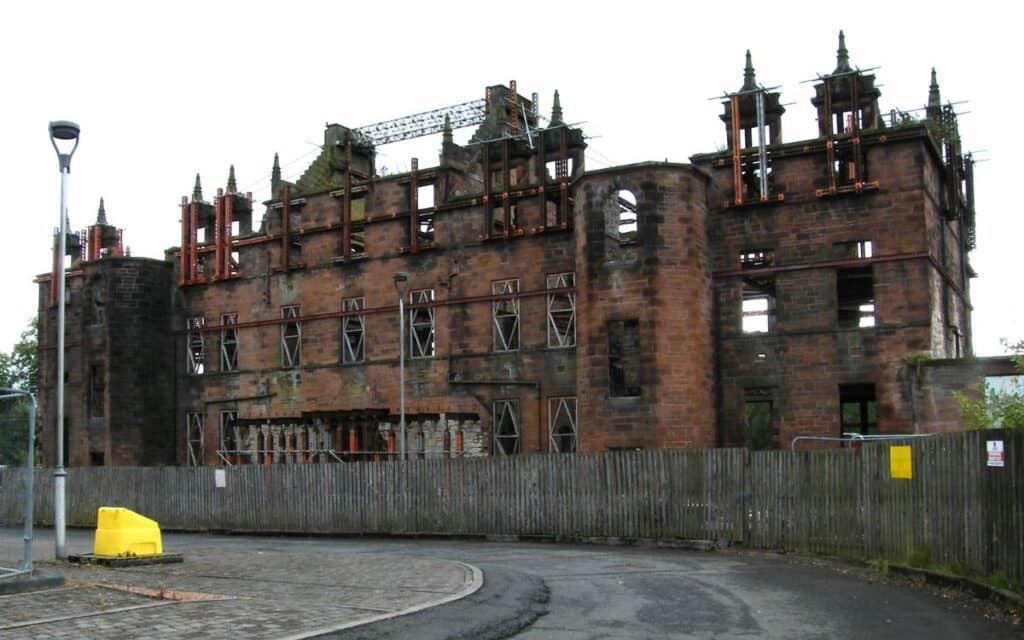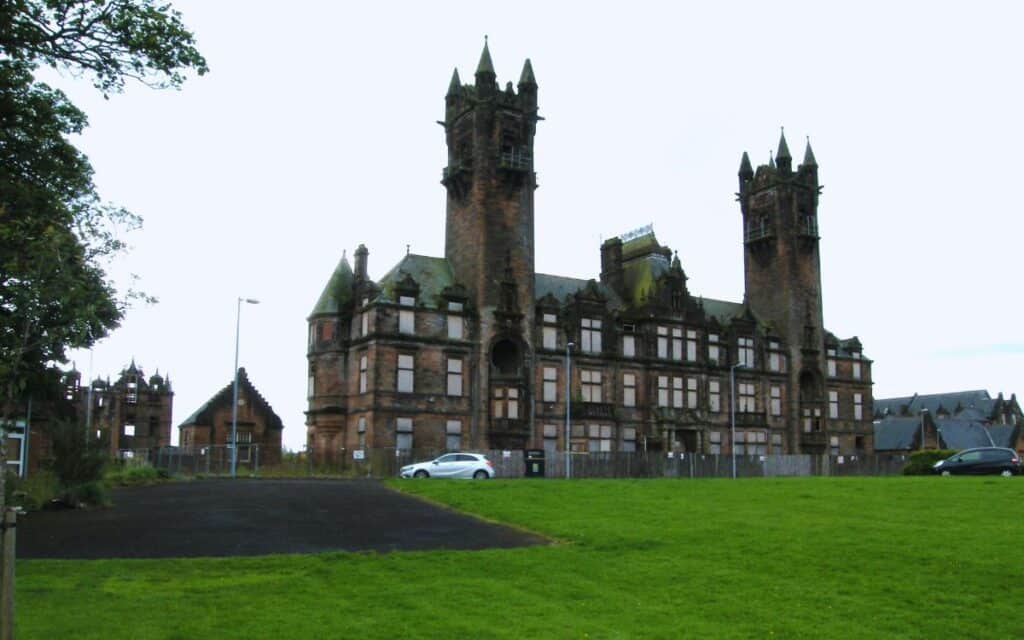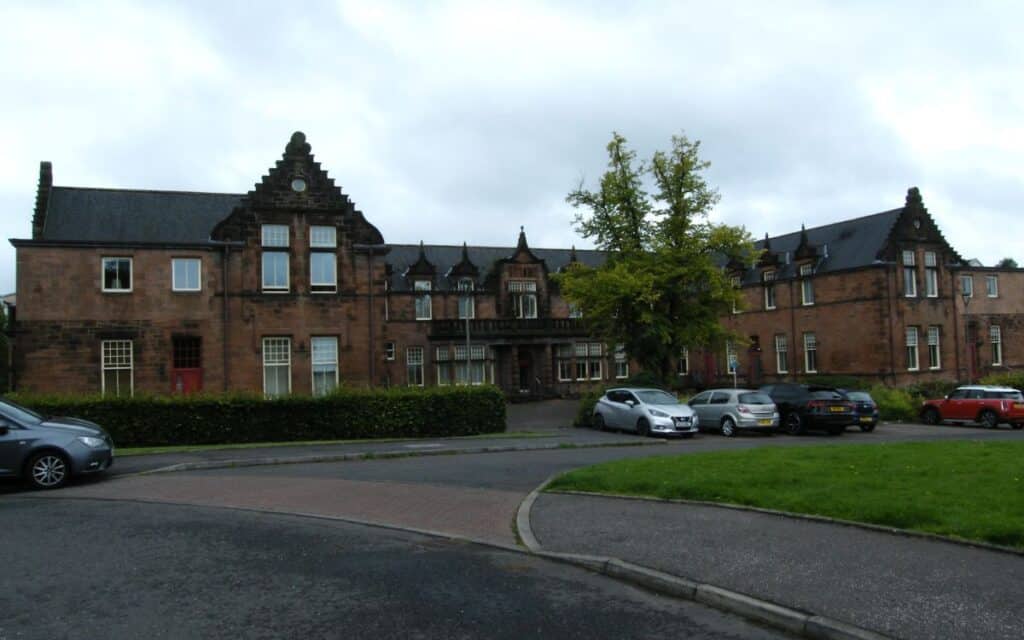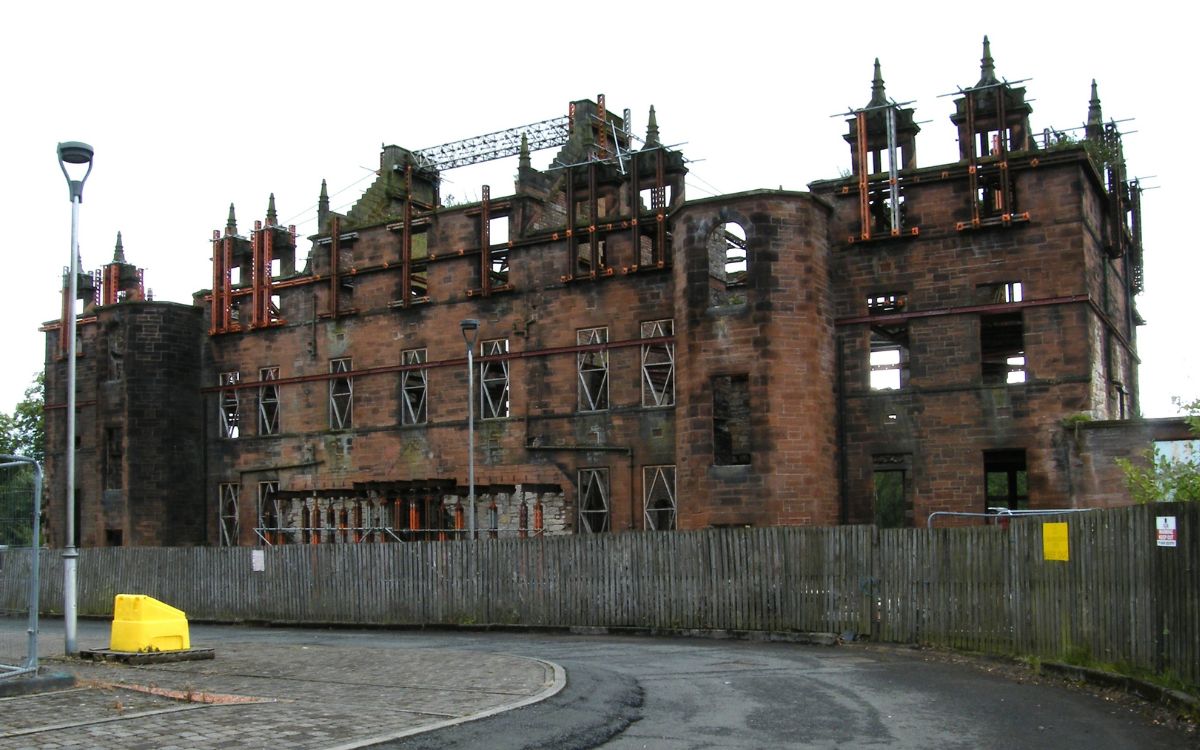Gartloch Hospital is an abandoned psychiatric hospital in Glasgow. DR PETER McCUE reveals the intriguing paranormal experiences of two nursing colleagues who once worked there.

With the move to providing mental health care in the community, many of the UK’s old psychiatric hospitals have now closed.
Gartloch Hospital, on the eastern fringe of Glasgow, received its first patients in 1896 and it closed in 1996.
Although it was principally a psychiatric hospital, there was a tuberculosis sanitorium in its grounds for a period.
And according to Wikipedia, it served as an emergency hospital, using hutted accommodation, during World War 2.
As for the present day, some of the remaining buildings have been renovated, with the creation of flats. Others are in a ruinous state.
This article is largely based on one by me that appeared in the February 2002 edition of The Psi Report, a newsletter of the Scottish Society for Psychical Research.
Some 21 years ago, two women informed me about ghostly experiences that they’d had while working at Gartloch Hospital. I’ll refer to them as Susan and Carol (not their real names).
I was unacquainted with Susan before she told me about her experiences, but I’ve no reason to believe that she lied to me.
Carol was a colleague of mine at a psychiatric clinic in Glasgow, and I judged her to be an honest informant.
Susan’s story
Susan worked as a nurse. When she was upstairs on night duty on Ward 1 at the hospital, she would sometimes hear a lock being turned and then footsteps ascending the stairs. The footstep sounds would stop at the top of the stairs, where there was a carpet.
Susan claimed that she wasn’t the only person to hear footsteps, and she related that, “When you went to the top of the stairs [at such a time], all of a sudden you would feel… cold.”
In about 1984, around five or six o’clock one sunny morning, maybe in June, Susan and another nurse on duty on the ward were anticipating a possible visit from a charge nurse.
Susan heard a lock being turned and footsteps. She went to the top of the stairs, to meet the person.
She heard footsteps coming up the stairs, and then saw a figure approaching, that of a woman of average height, attired in a grey tweed jacket, a long, grey tweed skirt, and a high-neck white blouse. Her hair was tied back. She appeared to be in her late 50s or early 60s.
Thinking that it was a real person, Susan spoke to her, but received no reply.
Instead, the figure looked Susan up and down with a kind of bemused smile, walked past her, and “kind of turned round to the back of [Susan]”. Susan turned round to see what was happening. The figure stopped, looked Susan up and down again, and then lifted off the floor at an angle, disappearing through the closed door of a nearby side room!
The nurse on duty with Susan wasn’t surprised to learn of her experience – “she’d heard it all before”. However, Susan hadn’t previously heard of such sightings. She explained that news of her experience got out, making people worried about going to work on the ward; and she said that it was put about, incorrectly, that she’d been quite unwell at the time of her experience.
Some eight years later, by which time she was working at another hospital, Susan was informed that a student nurse on Ward 1 had seen what she’d seen and was upset by it. (Note: Carol’s understanding was that the ward closed in 1988. If so, and if Susan’s experience occurred around 1984, the student nurse’s experience must have occurred within about four years, not eight years, of Susan’s experience.)
As noted above, the door through which the apparition allegedly disappeared led into a side room. Susan explained that patients placed there became disturbed and complained that someone was in the room with them, although that was often attributed to their mental state.
Within the side room, there was a locked door, beyond which there was supposedly a passageway leading to another part of the building. At one point, Susan was shown a photograph of a matron who’d formerly used the side room. She looked very much like the apparition that Susan had seen.

In the wintertime, around two or three o’clock in the morning, about a year after seeing the apparition on Ward 1, Susan was in a corridor in another part of the hospital, heading for Ward 26, when she heard voices and saw two women. (Note: if Susan’s apparitional experience on Ward 1 occurred during a summer month, and if her experience on the way to Ward 26 occurred in a winter month, the latter event must have occurred rather less than a year after the former experience, or rather more than a year after it.)
They looked about 30 or 40 years old and were dressed in old-fashioned navy-blue nursing uniforms and long white hats. One of them was holding what looked like papers. Susan reported that she clearly heard what they were saying.
But by the time she informed me of her experience, she couldn’t recall what it was (“…it was as though they were chatting about everyday things, and kind of laughing as well”). Although they were opaque, neither of them looked like the apparition that Susan had seen on Ward 1. They acted as if they were unaware of Susan, who ran back the way she’d come and then took a different route to Ward 26.
While staying in the nurses’ home at the hospital, some 20 years before relating her experiences to me, Susan would hear children singing outside, around 10 or 11 o’clock at night. The sounds seemed to come from some nearby woods. If she remembered rightly, this occurred in the wintertime. More recently, she’d been told about someone who reportedly used to feel ‘spooked’ by hearing children singing Ring a Ring o’ Roses at the back of the nurses’ home.
Carol’s story
Carol was in her 40s when she recounted her experience to me, some 21 years ago. She’d worked for a time as a nursing assistant on Ward 1 at Gartloch Hospital. The main sleeping area for patients was upstairs; downstairs, there was a lounge area and kitchen on one side, and a duty room and a side room on the other.
The side room contained a bed and was used if a patient needed special attention. The door could be locked if the occupant was violent, and it had a transparent panel through which the patient could be observed. A corridor led from the lounge area, past a locked door on the right, to the main entrance of the ward, also on the right. (Note: Carol was told that behind the locked door on the right there was a stairway leading to a room once used by a matron – maybe this was the side room on the upper floor mentioned by Susan.)
Opposite the entrance, a stairway led to the upper level of the ward.
On the occasion in question, which was probably in 1988, a staff nurse, an enrolled nurse and Carol were on the overnight shift (9pm to 8am). Carol and the enrolled nurse took it in turns throughout the night to remain downstairs, to keep an eye on a patient in the side room there.
During one such period, Carol heard footsteps in the corridor on two or three occasions. She got up and looked but saw no one. (Later, she asked her colleagues whether they’d been downstairs, but they denied that.)
She began her last period downstairs around 6am. About half an hour later, a nursing sister came into the ward. She and Carol made some tea and toast for themselves and their night duty colleagues. (Carol subsequently asked the sister whether she’d been in the ward earlier during the shift, but the sister said that she hadn’t.)
The patient in the side room was asleep, and the sister suggested that Carol have her tea with the staff upstairs. However, that was contrary to the stipulated procedure, which required that a member of staff remain downstairs if a patient was there. Carol and the sister set off down the corridor with the tea and toast.
As they came near to the locked door on the right-hand side, Carol saw a figure of a woman of about 70, in a long, grey, old-fashioned nurse’s dress, and wearing a frilly hat. It side-stepped out of the closed door, waved a finger at her, as if admonishing her, and then side-stepped back through the door! The figure was clear and opaque, but the sister didn’t see it. Carol rushed upstairs, burst into tears, and felt afraid. She didn’t sleep properly for about four days after this incident.

Comments on Gartloch Hospital Haunting
It’s not clear whether Carol and Susan saw the ‘same’ apparitional woman on Ward 1. They estimated her age differently, although they both depicted her dress or skirt as having been long and grey, and they both saw the apparition disappear through a door, albeit not the same one.
Prior to her own experience, Carol had heard that Susan had seen an apparition upstairs on Ward 1. Indeed, she was under the misapprehension that Susan had seen the figure more than once, and that staff on duty with her had also seen it.
Could the figure seen by Carol have been a purely subjective hallucination, created, subconsciously, to give expression to a sense of guilt about leaving a patient unattended? Perhaps.
But she reported that she hadn’t seen any other apparitions, so there’s no evidence of her being generally prone to visual hallucinations. Moreover, a guilty conscience wouldn’t explain the footsteps that she’d heard earlier during her shift.
If Susan and Carol have recalled and reported their experiences reasonably accurately, it would appear that paranormal phenomena occurred on Ward 1 and perhaps elsewhere at Gartloch Hospital.
Susan said that she knew other people who’d witnessed phenomena at the hospital, and I asked whether she could put them in touch with me, if they were willing to talk to me about their experiences. But I wasn’t given any contact details.
However, I spoke to another person who’d previously worked as a nurse on Ward 1, and she told me that she’d had no ghostly experiences there and that she didn’t know of anyone who had, although she was aware of a rumour about an apparition of a former patient, nurse or matron being seen there.
Therefore, it appears that if parts of Gartloch Hospital were ‘haunted’, the manifestations may have been only occasional and of low intensity. That may be fairly typical of what I call ‘sensory hauntings’, cases lacking distinctly physical (poltergeist-type) manifestations. (Note: A 2021 article by me in Issue 156 of Seriously Strange Magazine discusses sensory hauntings. The magazine is a publication of the Association for the Scientific Study of Anomalous Phenomena.)
Interestingly, Susan indicated that she’d experienced phenomena of the haunting type elsewhere. She said that the manifestations were ongoing and had also been experienced by others. Unfortunately, though, she wasn’t willing to go into details about them.
You can read about the hospital’s history in Guthrie Hutton’s Gartloch Hospital: 100 Years, published in 1994 by Richard Stenlake, Ochiltree Sawmill, The Lade, Ochiltree, Ayrshire KA18 2NX.
DR PETER McCUE is a retired clinical psychologist with a longstanding interest in anomalous phenomena. He’s the author of numerous articles and four books with a paranormal theme.



